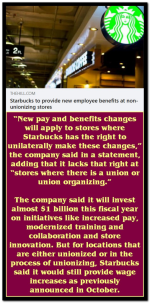Oh please.
Ma and pa and small and medium size businesses run the gamut in terms of pay and work conditions; your anecdote is not evidence.
True. However, my anecdote is consistent with the evidence.
Obamacare's employer mandate doesn't apply to places with fewer than 50 employees:
Some ADA rules only apply if you've got 15 or more employees:
Title I of the ADA applies to businesses with 15 or more employees, sometimes leading to confusion about whether any of the ADA applies to small businesses.

www.accessibility.com
Surveys agree that typically benefits, salaries, vacation time, and opportunity for advancement are better at big employers:
See what we discovered after surveying nearly 1,000 American employees about their preferences for working at big, midsize, and small employers. Is bigger always better?

www.paychex.com
Empirical studies confirm wages are better at large employers:
Similar for paid time off:
Between unlimited PTO and flexible vacation, our workforce sees a lot of PTO variability in 2020. So how much is average PTO for the U.S.?

www.zenefits.com
This evidence can be uncomfortable for people on the left, because there's been a decades-long focus on attacking big employers, creating an impression they're worse, when in fact they tend to be better.
If Bernie Sanders is going on about bad employer behavior, it's likely to be Amazon or Walmart, not the mom-and-pop store that pays half the wages, doesn't provide health insurance, gives employees considerably less paid time off, does less to accommodate disabled people, and offers no hope for meaningful advancement (and which, by the way, likely has all its profits go to the upper class, as compared to a publicly traded company, where dividends wind up partly in the retirement accounts of middle- and lower-class people, too). The petty little feudal lords of Main Street run entirely under his radar, even though, on average, they treat their workers a lot worse.
But even assuming it was, it's not these Ma and Pa shops that are dropping tens of millions or more on systemically destroying workers rights and unions.
They didn't have to, since unions don't even tend to form in environments with small employers, because workers are too atomized (and infiltrated with family of the owners) to organize. It's worth remembering that although there were guilds and occasional strikes in the era when nearly all employers were small employers, the modern union movement, and the big progress with things like the 8-hour day, the 5-day week, and OSHA protections, got its start when thousands of workers started to be brought under single employers, like textile mills, large scale mines, or railroads, and they had a critical mass to work with.
If the anger of the left is focused on Walmart, Amazon and Starbucks, that's probably because they deserve it, seeing as they're among the most aggressive and egregious vanguard against labour and workers rights in this country, to the point of breaking the law.
I don't think that's the main reason why it's them, and not, say, Allied Universal, which uses the same methods and also has a large workforce (much bigger than Starbucks). I think it's because they're name brands, and from the perspective of a politician, talking about companies that everyone has heard of gets more attention. As you say, they're "iconic." Maybe, from a strategic perspective that make sense -- winning a few high-profile fights against symbolically important firms and hoping that'll build momentum for a broader fight. But that's been the focus for a long time, and I'm not sure it's working.... and meanwhile, employers that, on average, treat workers a whole lot worse stay under the radar, including those exploitative mom and pop operations.
Basically, worker advocates are exhausting themselves trying to improve the already-relatively-good deal that employees at a handful of high-profile big employers are getting, and maybe that means diverting energy that could do more good for workers if it focused on getting changes in laws that would help EVERYONE, including those who can only dream right now of having a deal as good as those of Amazon and Starbucks employees. For example, how about pushing for mandatory PTO nationally, or expanding the ADA, FMLA, and affordable care, so that small employers aren't exempted? Before turning our attention to further enhancing the work experience of a relatively privileged class of workers, why not focus on helping out those who have been screwed over by the current rules that have effectively written into law the right of small employers to mistreat their workers in ways big ones can't?




